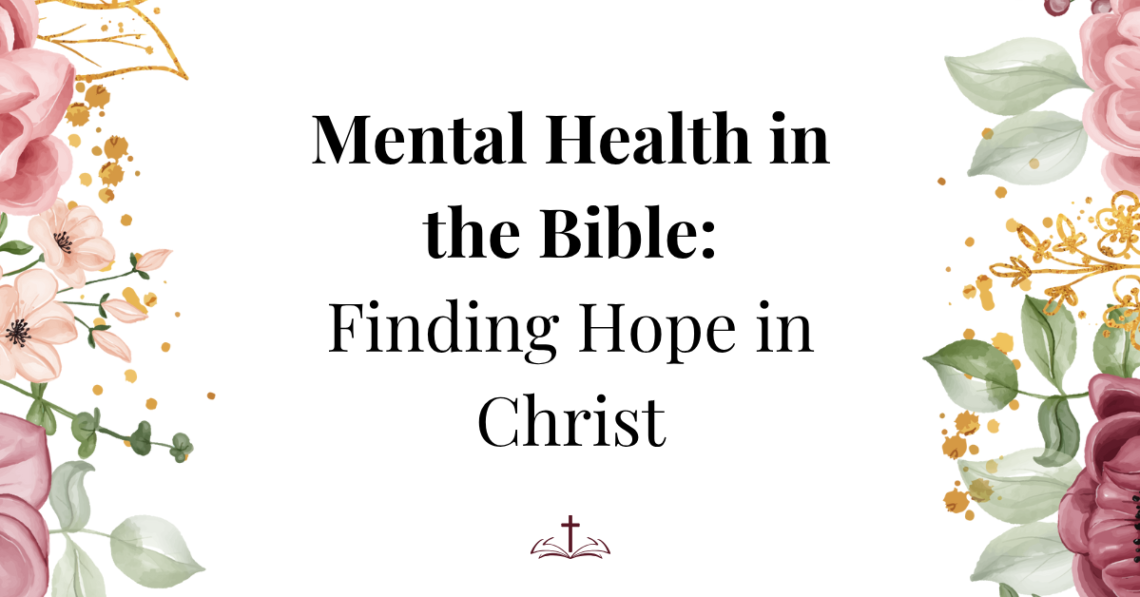In today’s fast-paced world, mental health concerns are becoming increasingly prevalent. Stress, anxiety, depression, and other mental health issues can take a significant toll on individuals, affecting their quality of life and overall well-being. These struggles are not only emotionally challenging but can also leave individuals feeling disconnected, hopeless, and overwhelmed. While modern approaches to mental health treatment offer valuable insights and solutions, many find solace and guidance in their faith. For Christians, the Bible offers profound wisdom that can bring hope and healing, providing a deeper understanding of mental health from a spiritual perspective.
In this blog post, we will explore the biblical perspectives on mental health, how finding hope and healing in Christ can be transformative, and the importance of integrating faith and professional help for holistic well-being.
Understanding Mental Health in the Bible
The Bible doesn’t use modern psychological terminology, but it contains numerous passages that address the human condition, offering wisdom for coping with life’s challenges, including emotional and mental struggles. For instance, in Philippians 4:6-7, believers are encouraged to “not be anxious about anything, but in every situation, by prayer and petition, with thanksgiving, present your requests to God. And the peace of God, which transcends all understanding, will guard your hearts and your minds in Christ Jesus.”
This passage directly speaks to those facing anxiety, which is one of the most common mental health struggles today. The Bible doesn’t just acknowledge the reality of anxiety but provides a pathway toward peace through prayer, thanksgiving, and reliance on God’s peace. It promises that God’s peace will guard both our hearts and minds, offering protection from the overwhelming nature of stress and worry.
Similarly, Psalm 34:17-18 reassures us that “the righteous cry out, and the Lord hears them; he delivers them from all their troubles. The Lord is close to the brokenhearted and saves those who are crushed in spirit.” These verses emphasize that God is near to those who are hurting. Whether the pain is emotional, spiritual, or mental, God offers His comfort and deliverance to those in distress. He hears our cries and is present with us in our suffering, providing a source of hope in even the darkest moments.
In fact, many of the Psalms are expressions of raw emotion, showcasing the mental anguish and despair that the psalmists felt. Yet, despite the pain, they continually turn to God for refuge and deliverance. These poetic prayers remind us that it’s okay to express our struggles to God and seek His healing presence.
Finding Hope in Christ
Central to the Christian faith is the belief in redemption and the transformative power of Christ’s love. Through His teachings, His miracles, and His sacrificial death, Christians find hope for salvation and healing from their brokenness, including mental health struggles. As Romans 15:13 declares, “May the God of hope fill you with all joy and peace as you trust in him, so that you may overflow with hope by the power of the Holy Spirit.”
When it feels as though despair is suffocating, Romans 15:13 reminds us that God is the source of our hope. Through trust in Christ, we are filled with His joy and peace, and His hope overflows into our lives, enabling us to overcome the deepest emotional struggles. The power of the Holy Spirit, promised to every believer, is an ever-present help that strengthens us when we are weak, bringing healing to our spirits and minds.
Furthermore, Jesus Himself offers solace to those burdened by life’s challenges. In Matthew 11:28-30, He invites the weary to come to Him: “Come to me, all you who are weary and burdened, and I will give you rest. Take my yoke upon you and learn from me, for I am gentle and humble in heart, and you will find rest for your souls. For my yoke is easy and my burden is light.”
This is one of the most comforting passages for those struggling with mental health. Jesus offers a reprieve from the weight of life’s burdens, extending an invitation to rest in Him. His yoke is not a heavy burden to bear but a gentle guidance that brings peace. For those overwhelmed by stress, anxiety, or depression, this promise of rest in Christ is an invitation to lay down the weight of our struggles at His feet and find healing.

Practical Steps for Healing: Seeking Support and Guidance
While faith can provide profound comfort and strength, it’s essential to recognize the importance of seeking professional help when facing mental health struggles. Just as we turn to God in prayer, we can also seek support from trained therapists, counselors, or mental health professionals who can provide valuable insights and strategies for coping with mental illness. Seeking professional help is not a sign of weakness but a wise and courageous step toward healing.
In fact, many Christians throughout history, including prominent figures like C.S. Lewis and Charles Spurgeon, have struggled with mental health issues such as depression and anxiety. They leaned on both their faith in Christ and the support of trusted individuals to navigate their mental health challenges. Just as God has gifted individuals with wisdom and skills in the field of mental health, seeking professional care can be a powerful complement to prayer and spiritual support.
Additionally, participating in a supportive Christian community can offer companionship, encouragement, and opportunities for communal prayer and worship. A strong community of believers can help lift each other up during times of struggle, offering a sense of belonging and solidarity. Ecclesiastes 4:9-10 reminds us that “two are better than one… If either of them falls down, one can help the other up.” In times of emotional or mental distress, it is vital to have a network of people who care for you and who can point you back to the hope we have in Christ.
Integrating Faith and Mental Health Care
When we talk about mental health in the Bible, it’s important to understand that faith is not meant to replace professional care but to work alongside it. A holistic approach to mental health involves nurturing the spiritual, emotional, and physical aspects of our well-being. Embracing both the wisdom of the Bible and the expertise of mental health professionals can create a comprehensive support system that fosters long-term healing.
Christians can approach mental health with a sense of balance. Prayer, meditation on Scripture, and community support can help strengthen the soul, while therapy, counseling, and medical treatment can address the practical aspects of mental illness. Just as the body needs nourishment, exercise, and medical care, so too does the mind and spirit. By recognizing the importance of both faith and mental health care, individuals can embark on a journey toward lasting healing.

Conclusion: Embracing Healing through Christ and Professional Support
In times of uncertainty and despair, turning to biblical perspectives on mental health can offer profound insights and hope for those struggling with mental illness. By embracing the love and grace of Christ, individuals can find solace, healing, and strength to navigate life’s challenges. As we turn to God, trusting in His promises, we can experience the peace that transcends all understanding.
However, it’s crucial to remember that faith complements rather than replaces professional mental health care. By integrating both spiritual and practical resources, individuals can embark on a journey towards holistic well-being and fulfillment in Christ. If you’re struggling with mental health issues, don’t hesitate to reach out for support and guidance, both within your faith community and from qualified professionals. With faith, hope, and perseverance, you can find peace and healing in Christ.
Join the Conversation
How have you found healing or comfort in your faith during times of mental health struggles? We invite you to share your thoughts and experiences in the comments below. If this post has encouraged you, we’d love for you to share it with others who may benefit from the message of hope and healing. If you’re in need of additional resources on mental health in the Bible, or if you have any questions about integrating faith and mental health care, feel free to reach out to us! Let’s continue the conversation on how we can support each other in our journey toward emotional and spiritual well-being. Together, we can grow in faith, healing, and hope.





